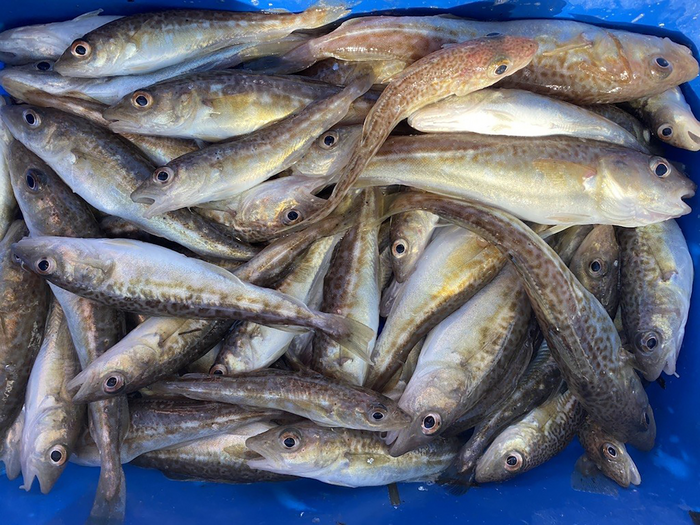The rumour that the coastal cod is extinct is not true. Through DNA analyses, researchers at the University of Gothenburg have identified that there are still juvenile coastal cod off the west coast of Sweden. However, it is still difficult to find any mature adult cod in the area.

Credit: Håkan Wennhage
The rumour that the coastal cod is extinct is not true. Through DNA analyses, researchers at the University of Gothenburg have identified that there are still juvenile coastal cod off the west coast of Sweden. However, it is still difficult to find any mature adult cod in the area.
By genetically analysing cod collected by test fishing, researchers from the University of Gothenburg and the Swedish University of Agricultural Sciences (SLU) have found that there are two distinct types of cod living in the waters along Sweden’s west coast. These types of cod belong to the same species – the Atlantic cod (Gadus morhua) – but they are different ‘ecotypes’, genetically adapted to different environments or lifestyles. The two types of cod found off the west coast are known as ‘offshore cod’ and ‘coastal cod’, because one has its origins far out to sea, while the other resides close to the coast throughout its life. These two types of cod rarely mate with each other.
Coastal cod remain in the fjords
Many people have long believed that the west coast’s coastal cod have been completely fished out. But this new study, published in the ICES Journal of Marine Science, shows that there is still a cod population that spends all its life off the west coast of Sweden.
“Our analyses show that a high proportion of juvenile cod in the fjords and near the west coast of Sweden are coastal cod. That shows that there is still something left to save. But in the test fishing, you get very, very few adult cod. In test fishing near the coast, only a handful of cod over 40 centimetres in length were found,” says Simon Henriksson, researcher at the University of Gothenburg.
For the study, the researchers collected juvenile, decimetre-long, cod from over 100 different sites in the Skagerrak, the Kattegat and the Sound (Öresund), and analysed them genetically. Their results show that the cod stock in the area is not just made up of offshore cod, but is a mixture of both ecotypes. Offshore cod are found mainly far off the coast and the coastal cod closer to the shore. In the fjords of West Sweden, the proportion of coastal cod is very high, which is a little unexpected given the theory that they were virtually extinct.
“In some places both offshore and coastal cod are found in the same fjord, but they appear to live at different depths. Offshore cod live at slightly greater depths, while coastal cod are more common in shallow waters,” says Simon Henriksson.
Uncertain where the coastal cod go after reaching adulthood
Adult offshore cod spawn in the North Sea or the Outer Skagerrak, and then strong ocean currents carry their eggs and larvae into Swedish waters. Sweden’s west coast acts as a nursery for offshore cod, which at the age of two to four migrate back to the offshore banks to spawn.
Where the coastal cod go after reaching adulthood remains an unanswered question, given that no spawning coastal cod are found in the fjords, despite the presence of juvenile cod there. Because coastal cod are also found in the Kattegat, the Sound and the Danish Straits, one theory is that their eggs and larvae drift with the currents from there and into the fjords of the Swedish west coast. This could explain the relatively large proportion of juvenile coastal cod found in the test fishing, despite a lack of adult coastal cod.
“In another study from 2019, cod eggs were found in the fjords, which seems to indicate that adult coastal cod do actually spawn in the fjords. But since we cannot see any genetic difference among coastal cod from different areas, we do not know for sure whether there are local spawning populations,” says Simon Henriksson.
The new study shows that the ecotypes display several differences in genes involved in environmental adaptation. This indicates that the differences in where they live may be because they are genetically adapted to different environments. For example, the ecotypes appear to be adapted to different physical conditions such as oxygen concentrations, salinity, and temperature. There are also genetic differences suggesting that the ecotypes differ in terms of foraging, as well as migratory and social behaviours.
Cod populations continuing to decline in Swedish seas
Unfortunately, the results of the genetic analysis do not mean that cod populations are recovering. On the contrary, the numbers of adult and juvenile cod are continuing to decline in all Swedish seas. However, the new results show that we need to account for the fact that there are two different types of cod, that differ genetically and geographically, if we are going to try to rebuild cod stocks along the west coast.
Journal
ICES Journal of Marine Science
DOI
10.1093/icesjms/fsac220
Method of Research
Observational study
Subject of Research
Animals
Article Title
Mixed origin of juvenile Atlantic cod (Gadus morhua) along the Swedish west coast
Article Publication Date
15-Dec-2022




